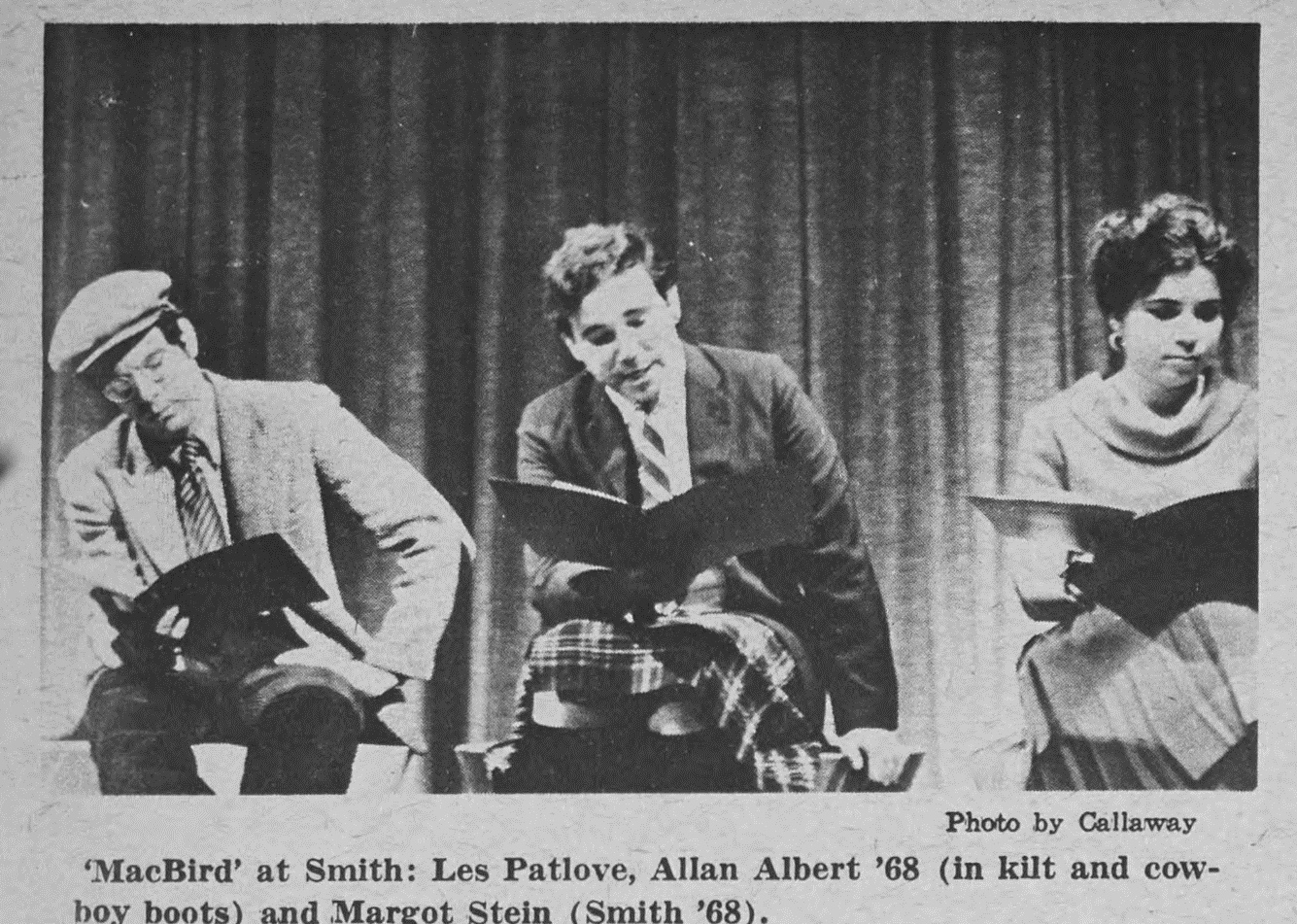Vicious and Witty ‘MacBird’ Given Subpar Performance
by Jim Steinman '69
Amherst Student

Lyndon Baines Johnson apparently finds great satisfaction in the exhibition of scars; but it is becoming increasingly obvious that he doesn't react at all favorably to having them inflicted. In fact, one could almost say he behaves like a trapped jungle beast when hit by the slightest nasty jab. Accepting this proposition, it's not too likely that Good Old Dada Bird is going to like brand-new "MacBird," play by Barbara Garson, if he ever sees it, or reads it, which is improbable. The play is one of the neatest, sharpest, most vicious incisions ever to cut directly into the rancid meat of the star-spangled butcher we know and love. What make Uncle Sammy run? Well, according to Miss Garson, it's stupidity arrogance, paranoia, egomania, hatred, selfishness, malice, and – oh, yes – murder. Among other patriotic impulses.
And, after finishing this play, one is left with a final, saddening thought. Those lonely, blue-eyed American Goths, sitting alone in the nasty jungle–hair on their chest, a cross through their nose, a green beret up their ass, and 10 thick inches pouring forth white Christian fire at the everywhere enemy – these holy orphans will never see this play. Too bad, really. U.S.O. doesn't plan a tour, and everyone else is too busy to care. The Breakfast of Champions awaits us in Asia, and we've got to keep on biting, chewing, digesting – while the getting's good. I bet they'd enjoy "MacBird." It's as funny as Bob Hope, and it packs almost as big a wallop as Cardinal Spellman. What more could one want?
Brittle and On Target
The play is based on Shakespeare's “Macbeth”: the structure of the work is borrowed from the earlier masterpiece. Miss Garson ingeniously utilizes the plot and many of the lines from "Macbeth" (and some other of the Bard's works) to comment on our current political situation. LBJ is MacBird, Lady Bird is guess what (who?); also romping about are John Ken O'Dunc (Duncan), Robert Ken O'Dunc (Malcolm-Macduff), Ted Ken O'Dunc, the Earl of Warren, the Wayne of Morse, and the Egg of Head (Stevenson). The satire is brittle, right on target, and uncompromisingly vicious, as well as unflinchingly honest. The writing itself (Miss Garson's ability to adapt the cadences, rhythms, accents, and style of language of Shakespeare's England to our modern idiom) is astonishingly good. The play is also immensely theatrical. It is one of the most important works of the contemporary American stage.
It is one of the most provocative aspects of the play that not only Johnson but every political figure (including our beloved, noble, dilettantish Kennedy's) is revealed as petty, ambitious, scheming, and monstrous.
"MacBird" was read at Smith College at Sage Two on Monday night. It was nice that somebody realized the value of the work and decided to give people an opportunity to become acquainted with it, but unfortunately, as a representation of Miss Garson's work, Monday's "performance" added up to very little and was extremely inadequate. The banquet scene, one of the best in the play, was cut completely, other important sections were confusingly or vaguely presented, and, most important, the whole work lacked focus. It was impossible to know where each scene took place, what person was reading which part, or exactly when the scenes changed. And, in this play, there are many important bits of stage business that add to the satire. By not even attempting to suggest them in this reading, a huge portion of the play's impact was destroyed. The cast was tired, boring, and generally uninteresting, or, what was worse, coy and self-conscious. As an exception, Allan Albert '68, as MacBird, was extremely funny, effective and accurate. His Texas accent was quite believable and he played the character to the hilt.
It is hoped that, in all fairness to the impressive accomplishment of this work, the people who saw the reading on Monday night will not judge "MacBird" by those standards. They ought to read the book, or, better yet, see the New York production. Everybody should. It's well worth it.
Source: Amherst Student archives